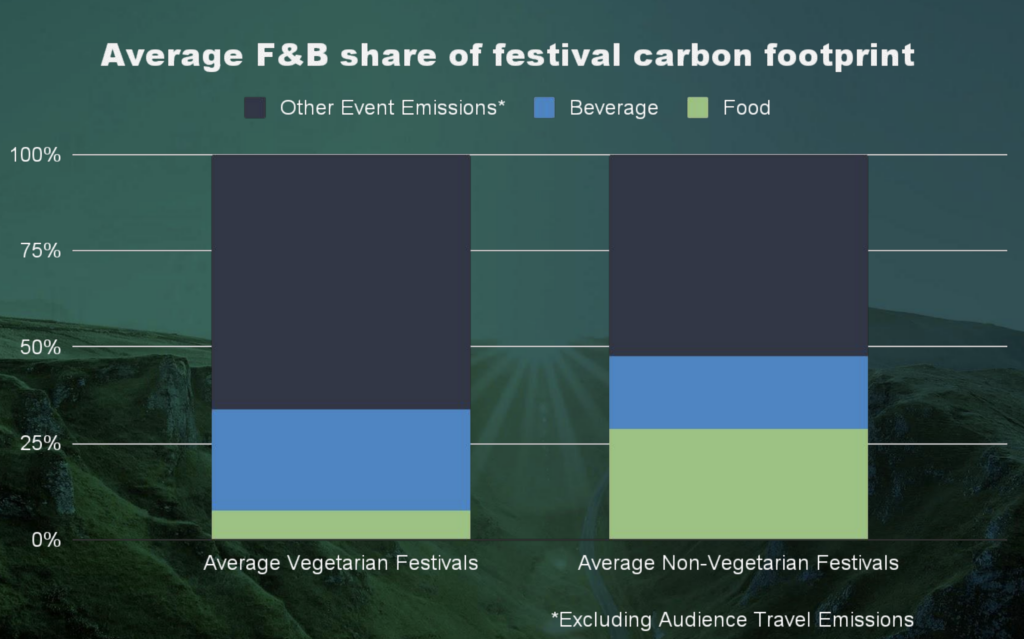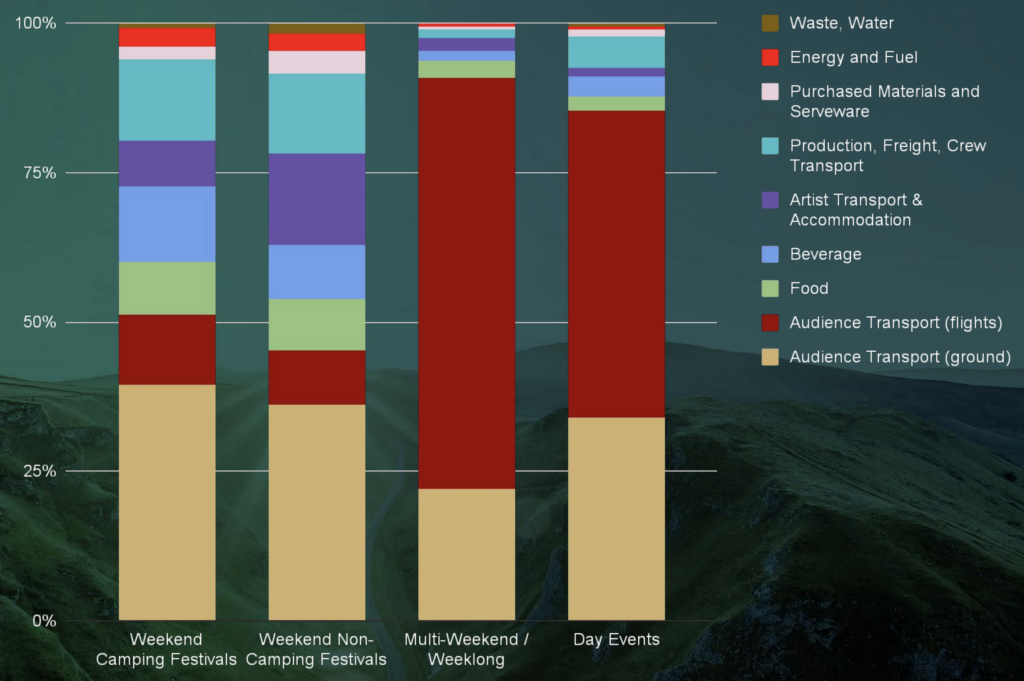Festivals Are Ditching Meat As Live Music Industry Reckons with Climate Impact
5 Mins Read
A rising number of festivals are going meat-free amid a wider sustainability shift in the live music industry, a new report has revealed.
In a year when one British band set the Guinness World Record for the lowest-carbon concert of all time, more and more music festivals undertook sustainability initiatives to mitigate their impact on the planet.
Live industry sustainability non-profit A Greener Future (AGF) – which advised trip-hop pioneer Massive Attack on its record-breaking Act 1.5 festival in August – suggests that after transportation, food and beverages are the biggest contributors to an event’s emissions.
A new report by AGF – analysing 40 festivals from 16 countries – indicates that organisers recognise the climate impact of food and drinks, with a fifth of the festivals being fully vegan or vegetarian in 2024, a massive jump from 8% the year before.
On average, around 55% of the food at all these events was meat-free. And even after excluding fully meatless events, that share stood strong at 50%. The difference in environmental impact is stark – when discounting audience travel, food alone makes up over a quarter of the remaining emissions in festivals where meat is served, though this shrinks to less than 10% for vegetarian events.
This should come as no surprise, considering that meat and dairy production is responsible for up to 20% of global greenhouse gas emissions, an impact twice as big as that of plant-based food.

How did live music events fare for the climate in 2024?
AGF called the uptake of vegan and vegetarian food by the live industry a “promising sign”, noting how “industrial animal agriculture and food production are among the biggest drivers of climate change and nature decline, and form a major part of an event’s environmental impact”.
The research revealed that more than half (54%) of the festivals collected data on the food served, while 82% had a formal food and drink sustainability policy.
There was progress across other metrics as well. The average daily waste per person per day across all festival types was 0.8kg – in contrast, this amounted to 1.4kg per person in the EU in 2023. Waste management improved too, as recycling rates rose from 38% in 2022 to 49% in 2024, while almost a quarter (23%) of events had a food salvation or redistribution strategy in place.
Moreover, two-thirds of festivals implemented a reusable cup system across the event, while 70% introduced a ban on single-use plastic.
Meanwhile, a quarter of the festivals ran entirely on mains electricity, and 20% ran on biofuel derived from hydrogenated vegetable oil (HVO). The use of the latter increased with the size of the festival, with nearly half of the energy at festivals with 50,000 or more attendees coming from HVO generators.

Courtesy: A Greener Future
The biggest culprit was audience travel, which made up between 34-90% of festival emissions, depending on its location, nature, and scale. The use of public transport, bikes and on-foot travel decreased in 2024 in favour of private cars and taxis. That said, electric cars were also slightly more common, though still representing a fraction of the total.
“There is room for improvement with regards to getting fossil fuels out of festivals and low-carbon travel, but we know how to do this and expect to see a rapid decline in diesel use in the coming years,” said AGF CEO Claire O’Neill.
“Festivals that work with AGF or apply for certification are generally environmentally aware and active,” she added. “Nevertheless, these results are promising, showing a trend towards decarbonisation and waste reduction.”
Bands and artists recognising the potential of low-carbon food
The report comes at a time when musical acts are growing increasingly conscious of their climate footprints. It’s why Massive Attack’s Act 1.5 festival sought to lay out a low-carbon playbook for the live events industry.
The festival featured 100% plant-based catering, an electric-powered stage, free electric shuttles and extra services in partnership with rail operators, and no car park. The brand prioritised local residents by giving them presale access and incentivised the use of public transport by offering access to a VIP bar and separate toilets.
Massive Attack and the organisers had a plan in place to prevent food waste, including redistribution and composting. People were encouraged to bring their own reusable cups for drinks, and all serveware was compostable. Additionally, no single-use plastics were allowed on site, either from traders or audience members.
Other artists are upping their sustainability game, too. Coldplay published a 12-point plan to halve their tour’s carbon footprint and successfully reduced its Music Of The Spheres Tour’s emissions by 59%, a figure it noted had been verified by the MIT Environmental Solutions Initiative. Crucially, however, this did not take into account audience travel, the largest source of emissions for these types of events.
In terms of food, it’s common to see plant-based food options available at the concerts of some of the biggest artists in the world. Billie Eilish, a noted vegan, directed London’s O2 Arena to serve only plant-based food during her 2022 residency and followed it up by ensuring vegan food is available at all venues of her ongoing Hit Me Hard and Soft tour. San Jose’s SAP Center went one step further, offering a completely vegan menu for her October dates.
Even Taylor Swift – often (fairly) criticised for her use of private jets – served plant-based meat at some of her Eras Tour shows. (While it’s a welcome measure, it does very little to move the needle – especially when accounting for the emissions from her record-breaking world tour.)
“We are happy to see more festivals going plant-based as this is one of the single most important changes events can make to protect nature and tackle climate change, and costs nothing,” said O’Neill.



